Sir Herbert Beerbohm Tree (1852–1917) was one of the most famous English actors and theatre managers of the late Victorian and early Edwardian period. In 1895 he put on the first production of 'A Woman of No Importance', a new play written by Oscar Wilde. Beerbohm Tree also helped the career of George Bernard Shaw, by producing 'Pygmalion' in 1914. His lavish productions with their strong emphasis on the visual can be seen as prefiguring the cinema. The versatile and skilled actor also appeared in some early British and American films. He founded the Royal Academy of Dramatic Art in 1904 and was knighted, for his contributions to the theatre, in 1909. Famous film director Carol Reed was one of his illegitimate children and actor Oliver Reed was a grandson.
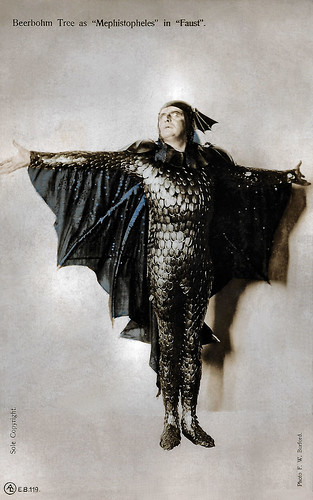
British postcard by A.L. (Aristophot Co. Ltd., London WC), no. EB 119. Photo: F.W. Burford. Printed in Germany. Sent by mail in 1908. Herbert Beerbohm Tree as Mephistopheles in the play 'Faust'.
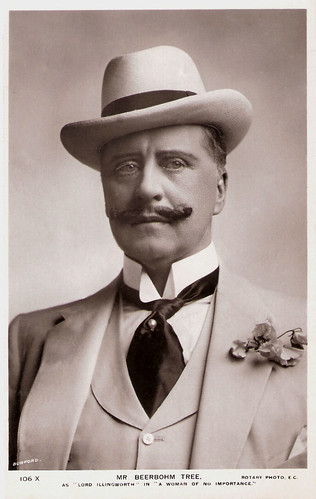
British postcard in the Rotary Photographic Series, no. 106 X. Photo: F.W. Burford. Herbert Beerbohm Tree as Lord Illingworth in the play 'A Woman of No Importance'.
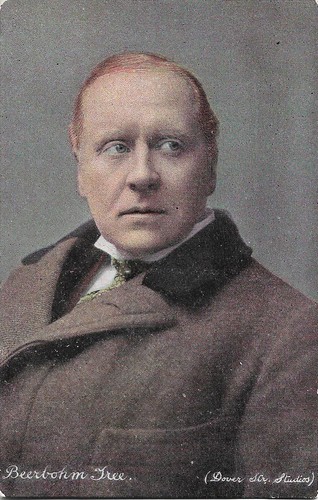
British postcard by Shuriday Publications, Aliday Ltd., Birmingham. Photo: Dover Street Studios.
Herbert Beerbohm Tree was born as Herbert Draper Beerbohm in Kensington, London, in 1852. Tree was the second son of Julius Ewald Edward Beerbohm, a prosperous corn merchant of Dutch, Lithuanian, and German origin, and his wife Constantia Draper. His younger brother was the author and explorer Julius Beerbohm, and his sister was the author Constance Beerbohm. A younger half-brother was the parodist and caricaturist Max Beerbohm from his father's second marriage.
Herbert attended his father's alma mater, Schnepfeuthal College in Thuringia, Germany. Upon his return to England, he began performing with amateur troupes, eventually using the name Herbert Beerbohm Tree, while working in his father's business. In 1878 he played Grimaldi in Dion Boucicault's 'The Life of an Actress' at the Globe Theatre, and shortly after, he began his professional career.
For the next six years, he performed mainly on tour in the British provinces, playing character roles, although he made his London debut late in 1878 at the Olympic Theatre under the management of Henry Neville. His first real success was as the elderly Marquis de Pontsablé in 'Madame Favart', in which he toured towards the end of 1879. Another London engagement was as Prince Maleotti in a revival of 'Forget-me-Not' at the Prince of Wales's Theatre in 1880.
His first London success came as the Rev. Robert Spalding in Charles Hawtrey's adaptation of 'The Private Secretary' in 1884. He made many comic embellishments to the role, which added to the popularity of the play. His next role was Paolo Marcari in 'Called Back' by Hugh Conway. The contrast between this dashing Italian spy and his timid parson in Hawtrey's play showed his versatility as a character actor.
Other appearances over the next two years included roles in revivals of A. W. Pinero's 'The Magistrate' and W. S. Gilbert's 'Engaged'. In 1886 he played Iago in 'Othello' and Sir Peter Teazle in 'The School for Scandal' with F. R. Benson's company at Bournemouth. The same year, in London, he made a success at the Haymarket Theatre, in the character role of Baron Harzfeld in 'Jim the Penman' by Charles Young.

British card. Herbert Beerbohm Tree as Hamlet.

British card. Herbert Beerbohm Tree as King Richard II.

British postcard in the Philco Series, no. 3018 c. Photo: Biograph. Issued as a Christmas card.
In 1887, at age thirty-four, Herbert Beerbohm Tree took over the management of the Comedy Theatre in the West End of London. His first production was a successful run of the Russian revolutionary play 'The Red Lamp' by W. Outram Tristram, in which Tree took the role of Demetrius.
Later in the year, he became the manager of the prestigious Haymarket Theatre. He produced and appeared on stage in some thirty plays during this decade. Popular farces and melodramas like the stage adaptation of 'Trilby' anchored the repertoire. The production ran for an extraordinary 260 performances. Tree also encouraged the new drama, staging Maeterlinck's 'The Intruder' (1890), Ibsen's 'An Enemy of the People' (1893), and Wilde's 'A Woman of No Importance' (1893), among others.
He supported new playwrights by producing special Monday night performances of their new plays. Tree also mounted critically acclaimed productions of 'Hamlet' (1892), 'Henry IV, Part 1' (1896), and 'The Merry Wives of Windsor' (1889), establishing himself as a Shakespearean leading man. The Times thought his Hamlet a ‘notable success’.
With the profits he had accumulated at the Haymarket, Tree helped finance the rebuilding of Her Majesty's Theatre in grand and tasteful Louis XV style, which he then owned and managed. He lived in the theatre from its completion in 1897 until his death in 1917. Over the next two decades, Tree staged approximately sixty plays there, programming a repertory at least as varied as he had at the Haymarket.
Tree mounted new plays by prominent British playwrights. His productions were exceptionally profitable; they were famous, most of all, for their elaborate and often spectacular scenery and effects. Unlike some other famous actor-managers, Tree engaged the best actors available to join his company and hired the best designers and composers for the plays with incidental music.
His productions starred such famous and talented actors as Constance Collier, Ellen Terry, and Lewis Waller. Tree often starred in the theatre's dramatizations of popular nineteenth-century novels, such as Sydney Grundy's adaptation of Dumas's 'Three Musketeers' (1898); Tolstoy's 'Resurrection' (1903); Dickens's 'Oliver Twist' (1905), 'The Mystery of Edwin Drood' (1908) and 'David Copperfield' (1914).
The classical repertory included such works as 'The School for Scandal' (1909). Tree also programmed popular melodramas, farces, romantic comedies, and premieres, such as George Bernard Shaw's 'Pygmalion', in 1914, in which Tree played Henry Higgins opposite the Eliza of Mrs. Patrick Campbell. Tree also took his productions on tour in America many times and visited Berlin's Royal Opera House in 1907 at the invitation of Kaiser Wilhelm II.

British postcard by J. Beagles & Co., London no. G 407. Photo: F.W. Burford. Herbert Beerbohm Tree as Nero and Constance Collier as Poppoea in 'Nero'(1906) by Stephen Phillips. 'Nero' opened at His Majesty’s Theatre, London, in 1906.

British postcard by J. Beagles & Co., no. 354 D. Photo: F.W. Burford. Herbert Beerbohm Tree as Isidore Izard in the play 'Business is Business'.

British postcard in the Rotary Photographic Series, no. 106 I. Photo: Rotary. Herbert Beerbohm Tree as Isidore Izard in the play 'Business is Business'.
Herbert Beerbohm Tree worked untiringly to make Shakespeare popular with the theatregoing public. He mounted sixteen Shakespeare productions and also established an annual Shakespeare festival from 1905 to 1913 that showcased a total of over two hundred performances by his company and other acting troupes. Tree overturned the popular wisdom at the time that Shakespeare productions would lose money, creating stagings that appealed widely to patrons.
In fact, his theatre's first Shakespearian play, 'Julius Caesar', was its first commercial success in 1898, running for 165 consecutive performances and selling 242,000 tickets. The next two years saw two more hits, 'King John' and 'A Midsummer Night's Dream'. Tree's longest-running revival, 'Henry VIII', ran for a sensational 254 consecutive performances.
Tree staged the Shakespeare plays, in particular, to appeal to the broad public taste for realistic scenery and scenic effects and lavish spectacle, mirroring the Edwardian fashion for luxury and extravagance. For example, in 'The Tempest' (1904), a replica of a sixteenth-century vessel was tossed in a storm; and in 'The Merchant of Venice' (1908), he recreated an authentic Renaissance ghetto.
Tree also pursued four Shakespeare film projects during his career at Her Majesty's. Luke McKernan writes at Who’s Who of Victorian Cinema: “Tree himself was one of the first major actors to be filmed and was remarkable and commendably positive about the cinema when many of his peers sneered at the phenomenon.”
Of great historical interest is King John (Walter Pfeffer Dando, William K.L. Dickson, 1899) for the British Mutoscope and Biograph Company. This short film contains four one-minute segments from Tree’s stage production of the Shakespeare play. One segment survives of this, King John's death scene at the end of the play. This is the first film record of a Shakespeare play.
Charles Urban filmed the opening shipwreck from the 1904 revival of 'The Tempest' at Her Majesty’s Theatre in 1905. Tree, whose role in the production was Caliban, did not appear in this scene. He played Cardinal Wolsey in the studio film Henry VIII (Louis N. Parker, 1911), based on the theatre's 1910 production. Tree was paid the unprecedented sum of £1000 lest the film proved unsatisfactory, or damaged ticket sales of the theatre presentation.
Filming took place at a studio in Ealing, West London, and took only one day, thanks to careful preparation beforehand. The film was presented to the public on 27 February 1911 in various theatres in London and in the provinces and was a huge success. The Moving Picture World wrote, "The picture is, without doubt, the greatest that has even been attempted in this country, and I am almost tempted to say in any other ... the acting passes anything ever seen in moving pictures before... The effect on the moving picture industry here will be enormous." As per an exclusivity deal, all prints were required to be burned six weeks after the first screening. No copies have come to light since.

British postcard by Rotary Photo, no. 4268 K. Photo: F.W. Burford. Herbert Beerbohm Tree as Shylock in 'The Merchant of Venice'.
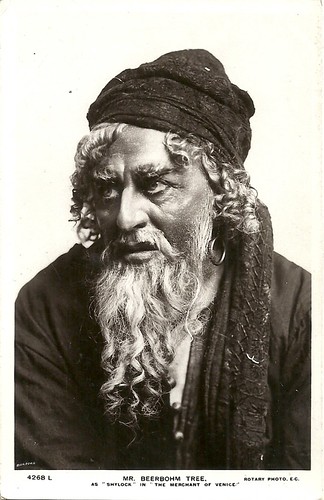
British postcard by Rotary Photo, no. 4268 L. Photo: F.W. Burford. Herbert Beerbohm Tree as Shylock in 'The Merchant of Venice'.
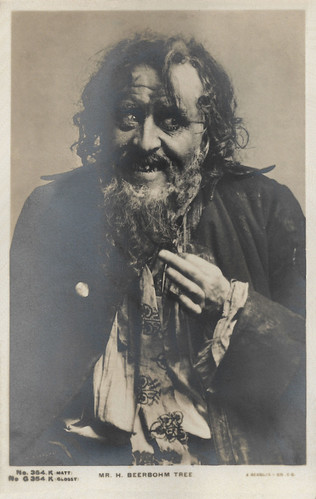
British postcard by J. Beagles & Co., London, no. 354. Photo: F.W. Burford. Herbert Beerbohm Tree as Fagin in 'Oliver Twist' by Charles Dickens.
In the last decade of his career, Herbert Beerbohm Tree's technique was seen as mannered and old fashioned. His spectacles, too, in comparison with the experimental methods of other producers, seemed outdated, although Tree responded to his critics by noting that his productions remained profitable and well attended.
Tree had married actress Helen Maud Holt in 1882. She often played opposite him and assisted him with the management of the theatres. Her charm also assisted the couple's entry into prominent social and élite artistic and intellectual circles.
Their daughters were actresses Viola Tree and Felicity Tree and poet Iris Tree. Tree also fathered several illegitimate children, including six with (Beatrice) May Pinney and other mistresses. Among his illegitimate children were acclaimed film director Carol Reed and Peter Reed, the father of the famous film actor Oliver Reed. He was also the grandfather of Hollywood screenwriter and producer Ivan Moffat and the great-great-grandfather of actress Georgina Moffat.
Tree founded the Royal Academy of Dramatic Art (RADA) in 1904. He also served as president of the Theatrical Managers' Association and assisted the Actors' Benevolent Fund and the Actors' Association. For his contributions to theatre, he was knighted in 1909. During World War I, Tree contributed his celebrity by delivering patriotic addresses. He wrote several books discussing the importance of the theatre and the arts in modern society.
Tree's last professional undertaking was a visit to Los Angeles in 1915 fulfilling a contract with the film company Fine Arts. He was in America for the greater part of 1915 and 1916. Tree played the title role in a film version of Macbeth (John Emerson, 1916), with David Wark Griffith producing. It is now considered a lost film. Afterwards he took over an extra role in D.W. Griffith's classic epic Intolerance (1916). His last film was The Odd Folks at Home (Chester Withey, 1916).
Herbert Beerbohm Tree returned to England in 1917 and died from pulmonary blood clots. He was 64.

British postcard in the Rotary Photographic Series, no. 4268 P. Photo: Rotary Photo. Sent by mail in 1909. Herbert Beerbohm Tree as The High Priest in the play 'False Gods.

British postcard by an unknown editor, no. 993. In the back, a portrait of Tree as Hamlet.
Sources: Luke McKernan (Who’s Who of Victorian Cinema), Thomas Staedeli (Cyranos), Wikipedia, and IMDb.
This post was last updated on 1 January 2020.

British postcard by A.L. (Aristophot Co. Ltd., London WC), no. EB 119. Photo: F.W. Burford. Printed in Germany. Sent by mail in 1908. Herbert Beerbohm Tree as Mephistopheles in the play 'Faust'.

British postcard in the Rotary Photographic Series, no. 106 X. Photo: F.W. Burford. Herbert Beerbohm Tree as Lord Illingworth in the play 'A Woman of No Importance'.

British postcard by Shuriday Publications, Aliday Ltd., Birmingham. Photo: Dover Street Studios.
Versatility
Herbert Beerbohm Tree was born as Herbert Draper Beerbohm in Kensington, London, in 1852. Tree was the second son of Julius Ewald Edward Beerbohm, a prosperous corn merchant of Dutch, Lithuanian, and German origin, and his wife Constantia Draper. His younger brother was the author and explorer Julius Beerbohm, and his sister was the author Constance Beerbohm. A younger half-brother was the parodist and caricaturist Max Beerbohm from his father's second marriage.
Herbert attended his father's alma mater, Schnepfeuthal College in Thuringia, Germany. Upon his return to England, he began performing with amateur troupes, eventually using the name Herbert Beerbohm Tree, while working in his father's business. In 1878 he played Grimaldi in Dion Boucicault's 'The Life of an Actress' at the Globe Theatre, and shortly after, he began his professional career.
For the next six years, he performed mainly on tour in the British provinces, playing character roles, although he made his London debut late in 1878 at the Olympic Theatre under the management of Henry Neville. His first real success was as the elderly Marquis de Pontsablé in 'Madame Favart', in which he toured towards the end of 1879. Another London engagement was as Prince Maleotti in a revival of 'Forget-me-Not' at the Prince of Wales's Theatre in 1880.
His first London success came as the Rev. Robert Spalding in Charles Hawtrey's adaptation of 'The Private Secretary' in 1884. He made many comic embellishments to the role, which added to the popularity of the play. His next role was Paolo Marcari in 'Called Back' by Hugh Conway. The contrast between this dashing Italian spy and his timid parson in Hawtrey's play showed his versatility as a character actor.
Other appearances over the next two years included roles in revivals of A. W. Pinero's 'The Magistrate' and W. S. Gilbert's 'Engaged'. In 1886 he played Iago in 'Othello' and Sir Peter Teazle in 'The School for Scandal' with F. R. Benson's company at Bournemouth. The same year, in London, he made a success at the Haymarket Theatre, in the character role of Baron Harzfeld in 'Jim the Penman' by Charles Young.

British card. Herbert Beerbohm Tree as Hamlet.

British card. Herbert Beerbohm Tree as King Richard II.

British postcard in the Philco Series, no. 3018 c. Photo: Biograph. Issued as a Christmas card.
Special Monday Night Performances
In 1887, at age thirty-four, Herbert Beerbohm Tree took over the management of the Comedy Theatre in the West End of London. His first production was a successful run of the Russian revolutionary play 'The Red Lamp' by W. Outram Tristram, in which Tree took the role of Demetrius.
Later in the year, he became the manager of the prestigious Haymarket Theatre. He produced and appeared on stage in some thirty plays during this decade. Popular farces and melodramas like the stage adaptation of 'Trilby' anchored the repertoire. The production ran for an extraordinary 260 performances. Tree also encouraged the new drama, staging Maeterlinck's 'The Intruder' (1890), Ibsen's 'An Enemy of the People' (1893), and Wilde's 'A Woman of No Importance' (1893), among others.
He supported new playwrights by producing special Monday night performances of their new plays. Tree also mounted critically acclaimed productions of 'Hamlet' (1892), 'Henry IV, Part 1' (1896), and 'The Merry Wives of Windsor' (1889), establishing himself as a Shakespearean leading man. The Times thought his Hamlet a ‘notable success’.
With the profits he had accumulated at the Haymarket, Tree helped finance the rebuilding of Her Majesty's Theatre in grand and tasteful Louis XV style, which he then owned and managed. He lived in the theatre from its completion in 1897 until his death in 1917. Over the next two decades, Tree staged approximately sixty plays there, programming a repertory at least as varied as he had at the Haymarket.
Tree mounted new plays by prominent British playwrights. His productions were exceptionally profitable; they were famous, most of all, for their elaborate and often spectacular scenery and effects. Unlike some other famous actor-managers, Tree engaged the best actors available to join his company and hired the best designers and composers for the plays with incidental music.
His productions starred such famous and talented actors as Constance Collier, Ellen Terry, and Lewis Waller. Tree often starred in the theatre's dramatizations of popular nineteenth-century novels, such as Sydney Grundy's adaptation of Dumas's 'Three Musketeers' (1898); Tolstoy's 'Resurrection' (1903); Dickens's 'Oliver Twist' (1905), 'The Mystery of Edwin Drood' (1908) and 'David Copperfield' (1914).
The classical repertory included such works as 'The School for Scandal' (1909). Tree also programmed popular melodramas, farces, romantic comedies, and premieres, such as George Bernard Shaw's 'Pygmalion', in 1914, in which Tree played Henry Higgins opposite the Eliza of Mrs. Patrick Campbell. Tree also took his productions on tour in America many times and visited Berlin's Royal Opera House in 1907 at the invitation of Kaiser Wilhelm II.

British postcard by J. Beagles & Co., London no. G 407. Photo: F.W. Burford. Herbert Beerbohm Tree as Nero and Constance Collier as Poppoea in 'Nero'(1906) by Stephen Phillips. 'Nero' opened at His Majesty’s Theatre, London, in 1906.

British postcard by J. Beagles & Co., no. 354 D. Photo: F.W. Burford. Herbert Beerbohm Tree as Isidore Izard in the play 'Business is Business'.

British postcard in the Rotary Photographic Series, no. 106 I. Photo: Rotary. Herbert Beerbohm Tree as Isidore Izard in the play 'Business is Business'.
Lavish Spectacle
Herbert Beerbohm Tree worked untiringly to make Shakespeare popular with the theatregoing public. He mounted sixteen Shakespeare productions and also established an annual Shakespeare festival from 1905 to 1913 that showcased a total of over two hundred performances by his company and other acting troupes. Tree overturned the popular wisdom at the time that Shakespeare productions would lose money, creating stagings that appealed widely to patrons.
In fact, his theatre's first Shakespearian play, 'Julius Caesar', was its first commercial success in 1898, running for 165 consecutive performances and selling 242,000 tickets. The next two years saw two more hits, 'King John' and 'A Midsummer Night's Dream'. Tree's longest-running revival, 'Henry VIII', ran for a sensational 254 consecutive performances.
Tree staged the Shakespeare plays, in particular, to appeal to the broad public taste for realistic scenery and scenic effects and lavish spectacle, mirroring the Edwardian fashion for luxury and extravagance. For example, in 'The Tempest' (1904), a replica of a sixteenth-century vessel was tossed in a storm; and in 'The Merchant of Venice' (1908), he recreated an authentic Renaissance ghetto.
Tree also pursued four Shakespeare film projects during his career at Her Majesty's. Luke McKernan writes at Who’s Who of Victorian Cinema: “Tree himself was one of the first major actors to be filmed and was remarkable and commendably positive about the cinema when many of his peers sneered at the phenomenon.”
Of great historical interest is King John (Walter Pfeffer Dando, William K.L. Dickson, 1899) for the British Mutoscope and Biograph Company. This short film contains four one-minute segments from Tree’s stage production of the Shakespeare play. One segment survives of this, King John's death scene at the end of the play. This is the first film record of a Shakespeare play.
Charles Urban filmed the opening shipwreck from the 1904 revival of 'The Tempest' at Her Majesty’s Theatre in 1905. Tree, whose role in the production was Caliban, did not appear in this scene. He played Cardinal Wolsey in the studio film Henry VIII (Louis N. Parker, 1911), based on the theatre's 1910 production. Tree was paid the unprecedented sum of £1000 lest the film proved unsatisfactory, or damaged ticket sales of the theatre presentation.
Filming took place at a studio in Ealing, West London, and took only one day, thanks to careful preparation beforehand. The film was presented to the public on 27 February 1911 in various theatres in London and in the provinces and was a huge success. The Moving Picture World wrote, "The picture is, without doubt, the greatest that has even been attempted in this country, and I am almost tempted to say in any other ... the acting passes anything ever seen in moving pictures before... The effect on the moving picture industry here will be enormous." As per an exclusivity deal, all prints were required to be burned six weeks after the first screening. No copies have come to light since.

British postcard by Rotary Photo, no. 4268 K. Photo: F.W. Burford. Herbert Beerbohm Tree as Shylock in 'The Merchant of Venice'.

British postcard by Rotary Photo, no. 4268 L. Photo: F.W. Burford. Herbert Beerbohm Tree as Shylock in 'The Merchant of Venice'.

British postcard by J. Beagles & Co., London, no. 354. Photo: F.W. Burford. Herbert Beerbohm Tree as Fagin in 'Oliver Twist' by Charles Dickens.
Illegitimate Children
In the last decade of his career, Herbert Beerbohm Tree's technique was seen as mannered and old fashioned. His spectacles, too, in comparison with the experimental methods of other producers, seemed outdated, although Tree responded to his critics by noting that his productions remained profitable and well attended.
Tree had married actress Helen Maud Holt in 1882. She often played opposite him and assisted him with the management of the theatres. Her charm also assisted the couple's entry into prominent social and élite artistic and intellectual circles.
Their daughters were actresses Viola Tree and Felicity Tree and poet Iris Tree. Tree also fathered several illegitimate children, including six with (Beatrice) May Pinney and other mistresses. Among his illegitimate children were acclaimed film director Carol Reed and Peter Reed, the father of the famous film actor Oliver Reed. He was also the grandfather of Hollywood screenwriter and producer Ivan Moffat and the great-great-grandfather of actress Georgina Moffat.
Tree founded the Royal Academy of Dramatic Art (RADA) in 1904. He also served as president of the Theatrical Managers' Association and assisted the Actors' Benevolent Fund and the Actors' Association. For his contributions to theatre, he was knighted in 1909. During World War I, Tree contributed his celebrity by delivering patriotic addresses. He wrote several books discussing the importance of the theatre and the arts in modern society.
Tree's last professional undertaking was a visit to Los Angeles in 1915 fulfilling a contract with the film company Fine Arts. He was in America for the greater part of 1915 and 1916. Tree played the title role in a film version of Macbeth (John Emerson, 1916), with David Wark Griffith producing. It is now considered a lost film. Afterwards he took over an extra role in D.W. Griffith's classic epic Intolerance (1916). His last film was The Odd Folks at Home (Chester Withey, 1916).
Herbert Beerbohm Tree returned to England in 1917 and died from pulmonary blood clots. He was 64.

British postcard in the Rotary Photographic Series, no. 4268 P. Photo: Rotary Photo. Sent by mail in 1909. Herbert Beerbohm Tree as The High Priest in the play 'False Gods.

British postcard by an unknown editor, no. 993. In the back, a portrait of Tree as Hamlet.
Sources: Luke McKernan (Who’s Who of Victorian Cinema), Thomas Staedeli (Cyranos), Wikipedia, and IMDb.
This post was last updated on 1 January 2020.
No comments:
Post a Comment